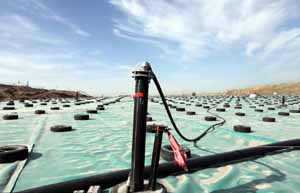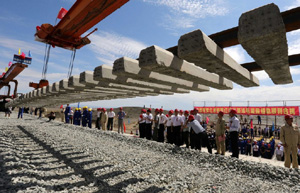Rich in resources, short on railroads
Covering a sixth of China's territory, Xinjiang has about one-third of China's coal reserves and a quarter of the country's oil and natural gas reserves. The underdeveloped ethnic minority-dominated region is desperate to improve its infrastructure in order to ship out its raw materials.
Xinjiang has only 4,911 km of railways, less than 5 percent of the country's total and hardly enough to transport the massive resources out of the region, said Wang Ning, a researcher with the Xinjiang Academy of Social Sciences.
The central government's railway investment has focused on high-speed passenger rail in recent years. Construction of local cargo railways has been delayed and funding is insufficient, which prompted the Xinjiang regional government to seek private funding, said Wang.
As a major coal, oil and natural gas producer in Xinjiang, Guanghui has the incentive to invest in the Hongliuhe-Naomaohu Railway, which will cut the route to bring coal from Hami prefecture to neighboring Gansu province by at least 1,000 km, said Wang.
Guanghui runs reserves of more than 20 billion tons of coal in Xinjiang, 1.592 billion tonsof oil and 421.3 billion cubic meters of natural gas in Kazakhstan, according to its official website.
To improve logistics, Guanghui built a 479 km long highway in 2010 specifically to transport coal in eastern Xinjiang to Gansu province. The company is expected to transport 39.5 million tons and 60 million tons of coal annually by 2016 and 2020 respectively thanks to the new railway.
The company has pinned high hopes on the cargo line as it will not only help move Guangui's own coal out of Xinjiang, but will also be able to transport materials for other major coal producers, including huge state-owned mining companies.
Call for solutions
Given railway infrastructure's prospects for long-term returns and public benefits, private rail projects must enjoy favorable treatment on power tariffs, financing and interest rate cuts, Li said.
"Private railway investors should have some decision-making power on freight rates when the railway is completed," she added.
Li called for the central government to formulate a detailed preferential policy for privately funded railways as soon as possible to guarantee reasonable economic returns for investors.
|
 |
 |
| Urumqi boasts first marsh gas power plant | First private railway line completed in Xinjiang |
